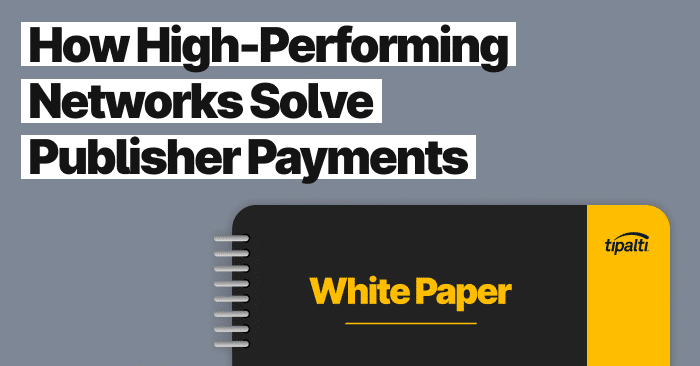
Tired of cumbersome payment processes that bog down you and your publishers? Learn how the highest-performing networks solve publisher payments.
Fill out the form to get your free eBook.

AdTech remains one of the most critical enablers for internet commerce and digital media. But if you’re an ad or affiliate network and not profitable in this market, there might be immediate issues that are affecting scalability—including an inefficient publisher payment strategy. In the white paper, How High-Performing Networks Solve Publisher Payments, see how successful, high-performing networks are dealing with publisher challenges and actively removing payments as an obstacle to future success. Download the white paper to learn: How to enhance global publisher relations How to reduce operational friction How to mitigate risk and fraud How to utilize automation as the key to network success.
In 2017, investors gave AdTech companies and start-ups the cold shoulder—they were hard to maintain, products were difficult to distinguish, and it’s not subscription-base, which investors favor.
But recently, investors are having a change of heart, and AdTech has recovered into a hot commodity in recent years, reaching a 500% surge in closed deals year over year. Even in the past year, AdTheorent went public with a valuation of $1+ billion, Mediaocean gobbled up Flashtalking for $500,000,000, and many other AdTech powerhouses have made colossal deals and acquisitions.
AdTech delivers immense value. Publishers are generating additional revenue compared to the pre-programmatic era, and marketers are reaping the benefits since AdTech cuts marketing costs by targeting users and converting consumers.
Deep Diving AdTech
AdTech represents technologies designed for managing advertisements across digital outlets, such as displays, video streaming, search, mobile, social, and practically any type of media. The AdTech industry uses software that develops and implements online advertising, digital publishing, and advertising strategies.
Advertisers leverage these technologies and tools to deliver targeted digital advertising to consumers. AdTech sets out to build data-driven marketing strategies that are targeted to consumers’ preferences.
Such solutions streamline complex workflow processes, including buying and selling ads, allowing brands to make educated decisions on budgets and maximize ROIs.
AdTech is Removing Cookies Across the Web
For decades, there has been much buzz around tech companies and how they handle their user’s data. AdTech stocks have surged due to web platforms ditching third-party cookies.
Historically, cookies helped advertisers target and measure the effectiveness of their ad campaigns. They’ve become a focal point for technologies to pin the business model of web publishing. But cookies are on the way out.
Google Chrome follows Safari and Firefox by blocking third-party cookies to protect web users’ privacy. Over 65% of the global internet users use Google Chrome, which will remove third-party cookies later this year. No one will be using a cookie-supporting browser when cookies are gone, sending cookies into extinction.
Cookies’ crumble comes from a global backlash against advertisers’ digital control. The public has been very outspoken about its discomfort with ad tracking, which led to a flurry of trust issues with AdTech software. Conglomerates, like Apple, have taken this public apprehension as an opportunity to market their devices as more privacy-focused. This marketing strategy led to widespread demand and cookies going away permanently.
PubMatic Provides Cutting-Edge AdTech Solutions
Anyone and everyone who is in tune with the AdTech industry knows that PubMatic is a force to be reckoned with. PubMatic continuously grows at a rapid scale, and it is differentiating itself from competitors by delivering value. Building “the future of digital advertising,” PubMatic improves ad quality in mobile apps and web, connected TVs, and online videos.
Combining the words “publisher” and “automatic,” PubMatic nourishes publishers’ abilities through its purpose-built technology. Its infrastructure provides profound outcomes for publishers and buyers (i.e., advertisers). Their colossal data assets and algorithms increase publisher revenue, improve cost efficiency, and raise ROIs.
They’re walking the walk—PubMatic’s connected TV revenue has grown over 5X since the first quarter of 2021.
AdTech Companies Automate their Finance Functions
AdTech is unstoppable, being valued at $438 billion in 2021 alone. To attract and retain publishers, AdTech businesses use automated solutions for all things payables.
As they continue to grow, ad agencies should elevate the innovative opportunities through various tools and knowledge. This robust tech stack should process payments regularly, have a self-service module to update bank information, relay remittance advice, and give visibility to past and future payments.
AdTech Amidst a Recession
It’s no secret that the world economy is preparing for a global recession. As we navigate these unknown waters, we can look at historical moments that helped pave the way for business success amidst uncertain times.
In the 1920s, Post Cereal was the number one cereal brand in the United States. When the Great Depression wiped out the American economy, Post cut all costs and put its efforts into mergers and acquisitions. Its smaller competitor, Kellogg’s, double-downed on advertising. The smaller cereal company even invested in a new, inexpensive, risky product called Rice Krispies. The rest is history—Kellogg’s dominated the market and exceeded Post in popularity.
While the times are much different, the lesson stays the same: taking risks and trying new products can be the lifeblood of surviving unprecedented times. AdTech is harnessing Kellogg’s spirit by providing modernized options with outstanding results.
